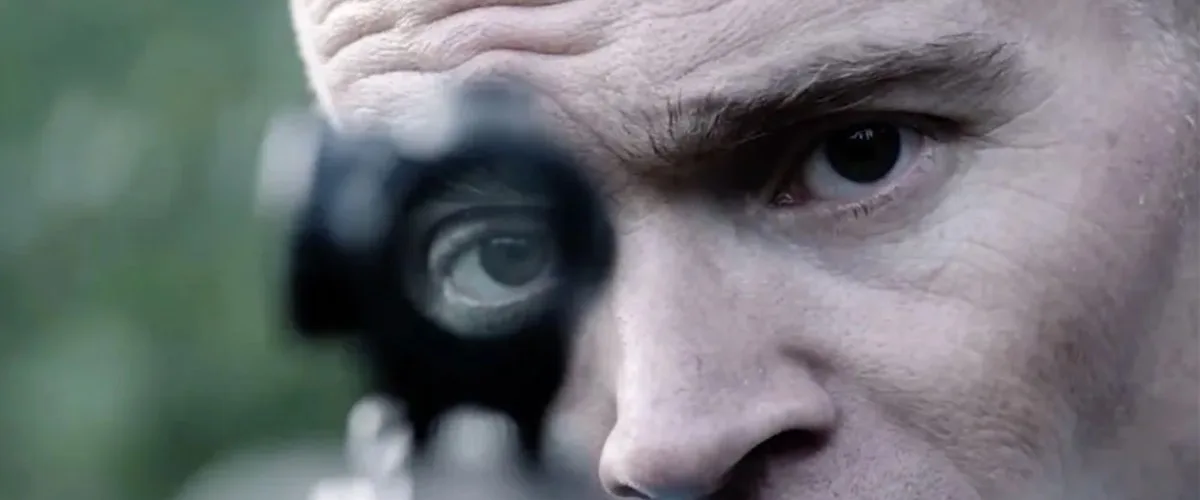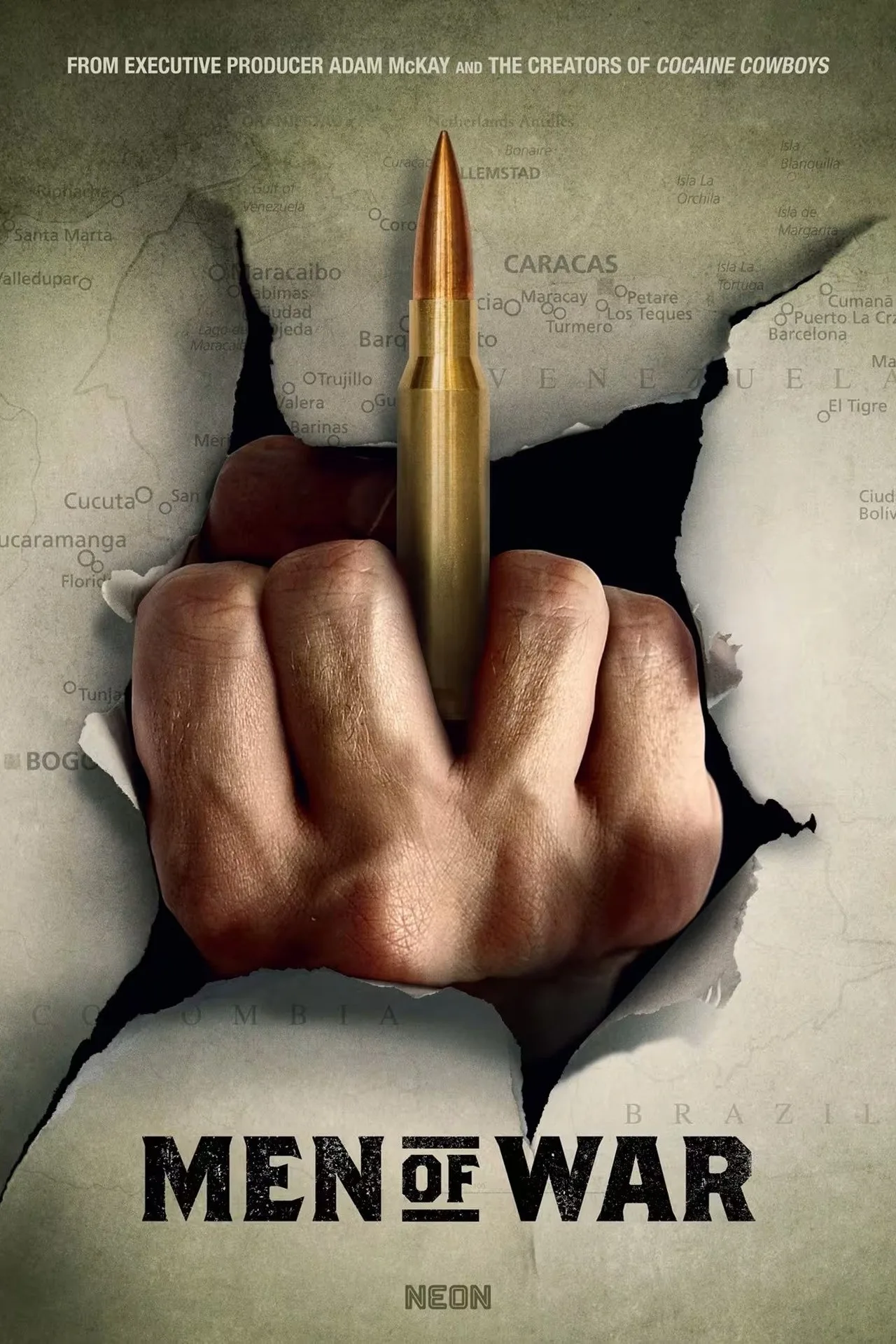Jordan Goudreau, the former Special Forces soldier who organized a disastrous 2020 coup attempt in Venezuela, is a Martin Scorsese antihero waiting to happen. He’s handsome, charismatic, a hustler and schemer, a compulsive talker, and a bad judge of his own capabilities. The more you hear him speak in “Men of War,” a documentary about the attempted coup, the less trustworthy and more pathetic he seems. The movie is problematic in a lot of ways, but there’s no denying that co-directors Jen Gatien and Billy Corben know how to choose a camera subject. Goudreau is constantly performing for the camera and for himself.
Goudreau sold himself as the guy who knew how to topple Venezuelan president Nicolas Maduro, a socialist who succeeded Hugo Chavez, and replace him with Juan Guaidó, who called himself the “interim president” of Venezuela but was really just the person that the US government preferred to have in charge of the country (and its rich natural resources). Maduro resisted letting US companies come in. Multiple people describe Guaidó in the documentary as a figurehead or puppet representing a shadowy network of political and business interests, including the arms dealers who would’ve profited from a civil war or a new dictatorship. By the end, even anti-Chávez forces within Venezuela who’d allied themselves with Guaidó decided he was a shallow grifter who wasn’t worthy of their trust.
The movie gives you all the details about what happened. There are a lot, and sometimes the political aspects are hard to follow. The gist: Goudreau was likely never capable of doing what he said he could do. He claimed he had the full backing and faith of the Trump administration, but what he probably really had was some prior, rather superficial relationships with Trump and Vice President Mike Pence’s heads of security, and spun those into something bigger to get potential clients to say yes to him. (He did have contacts in the administration, but it seems obvious from the texts that the filmmakers show us that they’re mainly just humoring him when he asks them to intervene and solve problems). The funding sources and contacts for the invasion dried up, including Guaidó, who signed an agreement through his chief representative promising to contribute tens of millions of dollars to the operation and then stiffed Goudreau.
Goudreau decided to go in anyway, even though he had only three speedboats, about 300 Venezuelan opposition soldiers, and two Americans he knew from his army days. Meanwhile, the Trump administration, Guaidó and his people, and the forces that would’ve benefitted from a coup watched from the sidelines to see if the plan worked anyway, hoping they could get the reward without too much risk. It was a disaster that left eight people dead and more imprisoned by the Maduro regime, including Goudreau’s friends.
Although Goudreau was born in Canada and served in the Canadian Armed Forces, he enlisted in the United States Army because, as he sardonically explains, there hasn’t been any period since the end of World War II when the country wasn’t invading or bombing somebody, which meant that if you liked soldiering, the US Armed Forces was the place to be. Goudreau tells the filmmakers that he always wanted to be a soldier like his great-grandfather, who served in World War I, and his grandfather, who served in World War II. He got his wish when the 9/11 attacks happened a few months after he was accepted by the US Army. He saw action in Iraq and Afghanistan. After that, he drifted into “private contractor” circles, i.e., mercenary circles, and decided to start his own security service, Silvercorp. It apparently consisted of just Goudreau, some business cards, a website, and his own personal savings.
Goudreau describes Operation Gideon as a perfect mission for former Special Forces guys because it would’ve been just like the fantasy scenarios that he and his buddies acted out during training: sneak into an authoritarian country, kill or capture a dictator, and free an oppressed people. Goudreau even calls the Venezuelan scheme a rare, golden example of an operation where “the heroes are really heroes and the villains are really villains.”
Of course, things were more complicated than that; they always are. The plan, as explained by Vox writer Alex Ward, would have involved 300 people concentrating on two cities in Venezuela. “One team would take over Maracaibo, Venezuela’s second-largest city, which has a crucial seaport. A second team would simultaneously push to Caracas, the capital, to launch an air assault on Maduro’s mansion with US helicopters flown by American pilots wearing Venezuelan military garb.”
Goudreau’s descriptions of watching war movies in childhood and adolescence—and later, after enlisting at age 17 with a parental waiver—confirm that when a viewer has decided that war is awesome and thrilling and a cool thing to take part in, no amount of antiwar messaging is going to penetrate their skulls. Goudreau compares himself to Captain America and Rambo, and talks about obsessively watching the second “Rambo” movie (the one where he goes back to Vietnam) as well as “Platoon” and “Full Metal Jacket,” both of which are about the dehumanization and exploitation of people at war. He also compares himself to Capt. Willard in “Apocalypse Now,” waiting on a mission. There’s no indication that he sees any difference between these various visions of war, much less that he cares that “Full Metal Jacket” ends with Marines being wiped out by an adolescent girl sniper, who the survivors execute, and that Willard is an alcoholic nihilist who’s circling the drain when he gets called in to find Col. Kurtz.
That last bit becomes a key unlocking deeper layers of Goudreau’s mania. Ditto revelations that, after the parachuting accident got him decertified as combat-ready and pushed him out of the Army, Goudreau was diagnosed with both PTSD and a brain injury, which, along with his obvious depression and loneliness, could explain how a man with such an amazing skill set could get involved in a scheme that nearly everyone, including participants, instantly realized was pretty dumb, even if they ended up participating in it.
I resented how the filmmakers saved the stuff about Goudreau’s health issues until late in the movie, rather than telling us about them up front and folding them into an otherwise rich character portrait of Goudreau. It reminds me of similarly manipulative choices in true crime films and TV shows that make it seem like it’s hard to figure out if somebody is a killer or not, and it turns out that investigators figured out he was a killer immediately, but the filmmakers decided to sit on the information to generate fake suspense and turn a real story into a game of Clue, which is more commercially viable than a straightforward account of what happened.
Still, this is a fascinating documentary, both in form and subject matter. The push-pull between what the movie wants to be and what it is makes it a perfect subject for film school classes dealing with the gap between intention and execution. The directors seem to be aping the cliches of ’80s and ’90s action cinema, particularly Tony Scott and Michael Bay, in the glitzy, hero-worshiping way that they photograph Goudreau. Co-director Gatien likes making documentaries this way; he specializes in what could be called Vice-ready subject matter, like “Cocaine Cowboys.” Goudreau participates in the process of being transformed into a fabulous object, striking poses against beautiful backdrops, and racing along on a motorbike while a drone camera films him.
It’s impossible to tell from what is onscreen whether the filmmakers encouraged Goudreau to dramatize himself this way, if he himself suggested it, or if it was some unholy symbiosis. It’s also impossible to tell if they set out hoping to satirize or deconstruct Goudreau, but sometimes forgot to, and found themselves participating in his self-hype instead. It’s easy to see how such a thing could happen. Goudreau is a smart, funny, handsome, physically fit man who could be Colin Farrell’s kid brother. He looks great from every angle, even when he’s crouched in the shadows, brooding and futzing around with his shaved-bald head. The Hollywood action movie aesthetic is a defensible way of representing the world as Goudreau sees it, and as he sees himself. But it gets in the way of seeing him clearly, as a hot mess who created and helped drive a bizarre footnote in world history.
But as a personality portrait, the movie is superb, rich in ways that may or may not be intentional. The inherent instability of the approach fuses with the manipulative charm and psychic damage of the subject. By the end, I felt like I’d seen a filmmaking experiment in which both the filmmakers and the subject assumed or hoped that they were controlling each other and presenting their own version of the truth, but the moviemaking process ultimately possessed all of them, and the end product was a third thing. There are moments when Goudreau is showing us the version of himself that he wants us to see and believe in. But there are other moments where he thinks that what he’s doing, but the mask slips off, and we glimpse a damaged man who can only be happy when he’s at war. He needs his dark medicine so badly that if no war is currently available for him to take part in, he will create one.




















